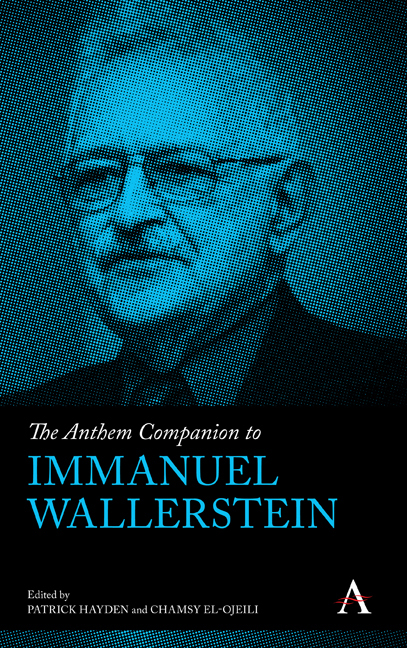Book contents
- Frontmatter
- Contents
- Notes on Contributors
- Acknowledgments
- Chapter 1 “There Is No Such Thing as Sociology”: Wallerstein as Sociologist
- Chapter 2 From Africa to the World: The Sources of Wallerstein’s The Modern World-System
- Chapter 3 Immanuel Wallerstein, World-Systems Analysis and the Structures of Knowledge
- Chapter 4 Wallerstein as International Political Sociologist: On Power, Hegemony and the Interstate System
- Chapter 5 The Agonies of Liberalism: Wallerstein on the Rise and Fall of Liberal Ideology
- Chapter 6 Global Inequalities Avant la Lettre: Theoretical Filiations and Radical Critique
- Chapter 7 Reckoning with Gender in the World-System: Insights from and Challenges to Wallerstein
- Chapter 8 The Past and Future of Antisystemic Movements: Possibilities and Limits of Social Change in Wallerstein’s World-Systems Analysis
- Chapter 9 The Global Environment and Climate Change inthe Modern World-System
- Chapter 10 Pervasive Pandemics: Understanding Global Healthand Disease from a World-Systems Perspective
- Index
Chapter 5 - The Agonies of Liberalism: Wallerstein on the Rise and Fall of Liberal Ideology
Published online by Cambridge University Press: 29 February 2024
- Frontmatter
- Contents
- Notes on Contributors
- Acknowledgments
- Chapter 1 “There Is No Such Thing as Sociology”: Wallerstein as Sociologist
- Chapter 2 From Africa to the World: The Sources of Wallerstein’s The Modern World-System
- Chapter 3 Immanuel Wallerstein, World-Systems Analysis and the Structures of Knowledge
- Chapter 4 Wallerstein as International Political Sociologist: On Power, Hegemony and the Interstate System
- Chapter 5 The Agonies of Liberalism: Wallerstein on the Rise and Fall of Liberal Ideology
- Chapter 6 Global Inequalities Avant la Lettre: Theoretical Filiations and Radical Critique
- Chapter 7 Reckoning with Gender in the World-System: Insights from and Challenges to Wallerstein
- Chapter 8 The Past and Future of Antisystemic Movements: Possibilities and Limits of Social Change in Wallerstein’s World-Systems Analysis
- Chapter 9 The Global Environment and Climate Change inthe Modern World-System
- Chapter 10 Pervasive Pandemics: Understanding Global Healthand Disease from a World-Systems Perspective
- Index
Summary
Immanuel Wallerstein's grand and sweeping narrative of the modern condition hinges on a central and seemingly slippery, deceptive and allegedly criminal character: namely, liberalism. Indeed, liberalism is the “cement” that, he says, binds the modern world order. It gives it its unity and orchestrates its evolution and development. From its beginnings as an ideological response to the French Revolution in 1789 to its apotheosis in the global hegemony of the United States after the Second World War, to its dissolution in the collapse of Soviet communism, liberalism is the analytical thread that animates Wallerstein's world-systems analysis (WSA). This chapter aims to explicate and engage with his account of modernity and to focus specifically on the role he assigns to liberalism. I focus on three texts in which Wallerstein sets out his account of liberalism and his detailed critique of its role in the globalization of capitalism—the fourth volume of his monumental series The Modern World-System (Centrist Liberalism Triumphant, 1789–1914), After Liberalism and World-Systems Analysis: An Introduction.
It is essential to first briefly set out the idea of WSA, which is the theoretical architecture that supports the narrative of modernity in which liberalism plays such a prominent role. With this background in hand, I will turn to a close examination of liberalism as ideology, emphasizing the very particular and specific meanings Wallerstein assigns to these crucial terms. However, this task cannot be achieved simply by a conceptual analysis of these ideas since it is crucial to the very idea of WSA that such ideas are embedded in their particular historical contexts. Liberalism is the dominant and dominating ideology beginning in the aftermath of 1789, but since its meaning is thoroughly embedded in time and space, its existence and effects have not only a location first in Western Europe and the world as a whole, but also a time—a beginning and an end. The third section examines Wallerstein's surprising and contrary claim that rather than representing the final victory of liberalism, the dismantling of the Berlin Wall signaled the final defeat of liberalism as a world-dominating ideology.
- Type
- Chapter
- Information
- The Anthem Companion to Immanuel Wallerstein , pp. 83 - 102Publisher: Anthem PressPrint publication year: 2023



